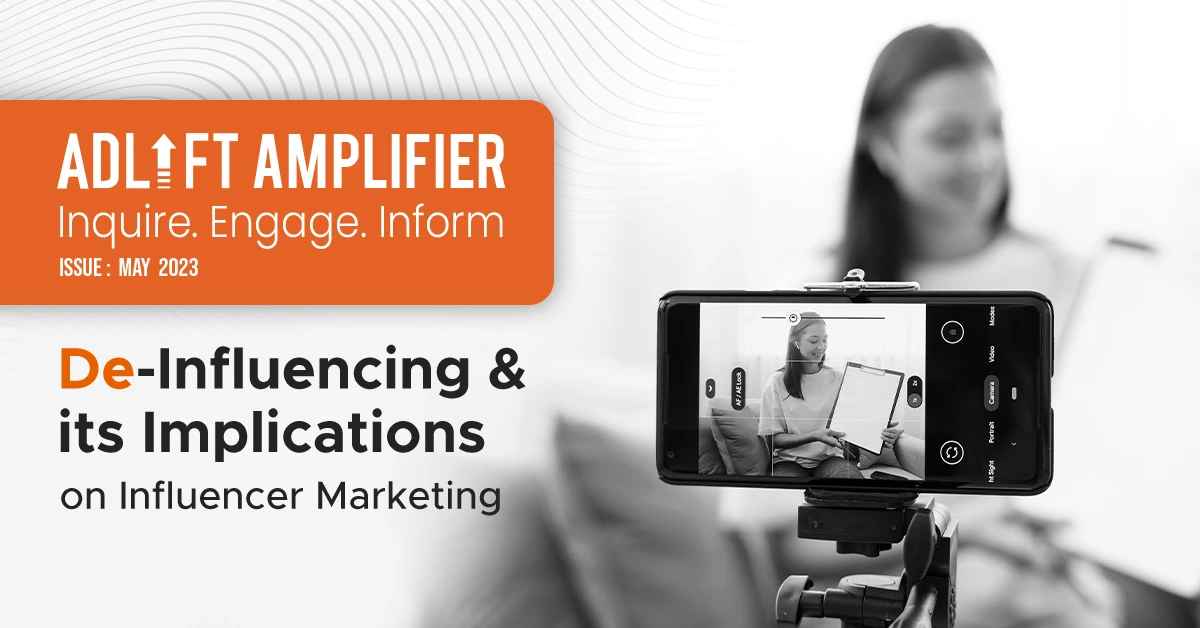De-Influencing: Its implications on Influencer Marketing

No matter where you go, whether it is real life or social media, someone out there is trying to sell you something, whether it’s brands and their advertisements or social media influencers with their series of posts talking about how amazing some products are for XYZ reasons.
Influencer marketing, as you may already know, has been on the rise, with social media being flooded with promotional posts. Consumers are spoilt for choice and often find themselves buying more stuff than they really need. However, the world is now moving towards a more sustainable lifestyle, which has led to the emerging ‘de-influencing’ trend.
Understanding De-influencing
De-influencing may be trending as the latest buzzword in the influencer marketing industry, but in no way is it a new practice. It occurs when users of social media persuade their followers not to purchase particular products. They might be doing this to draw attention to unethical business practices by the company that makes the products in question, to advocate for less expensive, more environmentally friendly alternatives, or to expose deceptive marketing by another influencer. The practice, which predominately appears on Instagram, TikTok, and YouTube, is rapidly gaining popularity.
According to social analytics company Brandwatch, mentions of de-influencing on social media networks grew by more than 3,000% between 1 January and 10 March 2023. The hashtags #antihaul, #overconsumption, and #whatnottobuy are also being used frequently in conjunction. Users who were disappointed with products that, although being heavily promoted by other influencers, did not live up to the marketing hype tended to respond to de-influencing messages.
Insulating Brands from De-Influencing
While de-influencing may seem like an elevated form of negative reviews, it can often pose a serious challenge to many brands. The main reason is that the individuals giving negative reviews often have a large following, leading to a significant impact and long-term harm for brands. It is also possible for rivals to get de-influencers to defame their counterparts. Therefore, it is vital for brands and their marketers to focus on strengthening their marketing strategies. Here are a few strategies marketers can employ to combat de-influencing trends:
Carefully Select Influencers for Long-Term Partnerships
Marketers should collaborate with reputable and influential individuals to thrive as a brand and uphold their reputation amidst growing challenges. Establishing long-term contracts with influencers instead of short-term ones enables marketers to gain control and develop deeper business relationships. It is crucial to thoroughly evaluate potential influencers to ensure they align with the brand’s values, facilitating clear expectations and ultimately delivering better content for the target audience.
Emphasize Exceptional Product Quality
Authenticity is the foundation of brands and customer relationships. Brands must prioritize maintaining top-notch product quality and conveying a clear positioning to their target audience. By being transparent, brands can ward off trends like de-influencing, capture customers’ attention and affection, and distinguish themselves from competitors.
Reinforce Positive Online Discussions
Brands should actively enhance their digital presence across all platforms and channels. It is essential for brands to participate in social and community interactions related to their products or services, addressing customer issues and providing solutions. By encouraging customers to speak positively about the brand, its credibility is reaffirmed, and the impact of de-influencers is diluted.
Influencer Marketing in the Age of De-influencing
The internet has democratized access to information about companies and their products, including false information. It can be problematic for businesses since they have little control over how it spreads on social media.
The big names of the creative economy have historically used their power over their millions of followers to aid businesses in marketing their goods. It has been beneficial for the success of in-app purchasing features that channels with algorithms that prefer brief video content are becoming more and more popular. According to a Kantar study, more than a quarter of social media users have purchased a product after reading an influencer’s online endorsement.
However, to be influential, you don’t need millions of followers. Brands have come to value micro-influencers, who are individuals with 1,000 to 100,000 followers, more and more. According to (The level of engagement that micro-influencers are able to demand does appear to be platform-dependent; according to Influencer Marketing Hub, their engagement rates on TikTok were 17.9%, compared to 3.9% on Instagram and 1.6% on YouTube.)
‘Ordinary’ consumers’ online content can likewise have a significant impact. According to research by consumer experience platform Nosto, 79% of viewers believe that such content has a significant impact on their purchasing decisions, whereas only 9% say the same for content created by influencers.
The Bottom Line
In essence, de-influencing represents a call to action, urging individuals to reassess their relationship with material possessions and be more mindful about their consumption habits and patterns. It promotes a more sustainable and mindful approach to consumption, aligning with the principles of reducing waste and minimizing environmental harm.
The case for de-influencing revolves around the recognition that influencer culture often fuels overconsumption and materialism. By embracing this movement, individuals can challenge the persistent desire for more, opting instead for a more sustainable and mindful approach to consumption. De-influencing is a powerful tool for promoting a healthier relationship with material possessions and ultimately contributing to a more sustainable future.
Recent Posts
- Go Viral in Seconds: How to Upload a YouTube Short? April 17, 2024
- Multi-Channel Mania: Mastering Distribution Channels to Reach Customers Everywhere April 12, 2024
- From Product to Promotion: A Fresh Take on the 4 Ps of Marketing April 12, 2024
- Is Your Marketing Paying Off? The Ultimate Guide to ROAS April 12, 2024
- Understanding HTML Sitemaps: A Key Component for Website Structure April 12, 2024
- Checking Website Traffic: Tools and Methods for Analysis April 12, 2024
- Exploring Sitemap Examples: A Guide to Effective Website Organization April 12, 2024
- Tackling Cart Abandonment: Strategies for Recovering Lost Sales April 11, 2024
- “Crafting Your Unique Selling Proposition: Stand Out in the Market “ April 11, 2024
- Create Content that Connects: Target the Most Searched Topics on YouTube April 1, 2024
Get
in Touch
Contact AdLift for a 360-degree marketing plan

